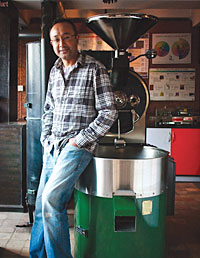 |
 FOO CHEE CHANG |
Himalayan Java was established in the year 2000 and was initially located at Heritage Plaza in Kamaladi, a commercial complex that Pradhan had hoped would be able to sustain the business. This proved not to be the case as the coffee house floundered in its early days.
Pradhan attributed this to the persistence of a 'tea-drinking culture' in Nepal. Even when people did drink coffee, it was the instant variety that was much more affordable than specialty coffee. So Pradhan acted quickly to shift the coffee house, then only three months old, to its current location in Thamel. It proved to be a stroke of genius.
Snap judgments like these have characterised Pradhan's approach to his career. After completing his Bachelors in Hospitality Management at William Bleu International Hotel Management School in Sydney, Australia, he worked at a prominent five-star hotel in Nepal for a mere eight days before deciding to quit.
"End of the day, if you're not even satisfied with the job you're doing, you shouldn't be doing it," he explains. Looking for a business venture, he did a market survey and found that the city had all food and beverage operations covered?except a specialty coffee house.
Pradhan's love affair with coffee began while he was a student in Australia. He fondly recalled his frequent visits to small, independent coffee shops, which would prove to be the model and the inspiration for Himalayan Java ? great coffee enjoyed in an equally great setting.
Despite Himalayan Java's humble beginnings, it's hardly just a coffee shop today. It's a 'coffee institution' in Nepal. Other than the fact that it only uses coffee grown in Nepal, the organisation is also involved in bringing in high-quality machines such as roasters, grinders, espresso machines and commercial urns through Mocca Trading, an arm of the company that also exports Nepali coffee to other countries.
At home, Himalayan Java has helped other caf?s find their feet. From location scouting to hiring and training the right people, the company is keen on developing the local specialty coffee scene. Two examples of coffee houses that have benefited from their support are Coffee Express and Magic Beans.
Other than creating new employment opportunities and having more control over coffee quality, Himalayan Java hopes to increase the comparatively minuscule local output of 300 tonnes annually, and the 20 tonnes that they are currently able to buy and export to countries such as the United States and in Europe. The company is looking into growing its own coffee here, namely the Arabica variety that would thrive in Nepali conditions.
Himalayan Java has been recognised as a member of the Specialty Coffee Association of America and only uses coffee certified as organic by the United States Department of Agriculture. The company is now ready to take on competition from world-famous brands such as Starbucks and Gloria Jeans.
But Pradhan welcomes such challenges. "Customers will have a way to compare different coffees and decide which is best," he says. "Anything can come, I can still compete."
Previous Company of the month:
November 2007
December 2007
January 2008
February 2008
March 2008
April 2008
May 2008
July 2008
April 2009
May 2009
June 2009
July 2009
August 2009
September 2009
October 2009
December 2009


